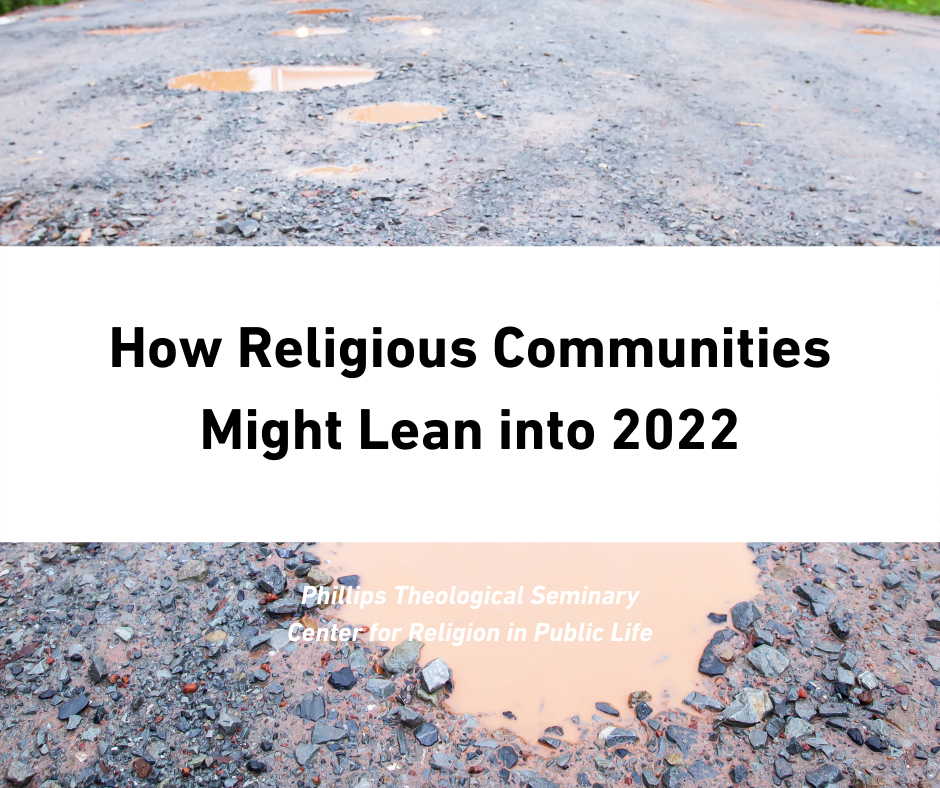How Religious Communities Might Lean into 2022
 America is in for a bumpy 2022. Consider a few of the accumulating moral and spiritual dilemmas facing us (there are many more…).
America is in for a bumpy 2022. Consider a few of the accumulating moral and spiritual dilemmas facing us (there are many more…).
Surely, America will surpass one million people dead from the pandemic. If you have a better imagination than I, you might picture the continuing consequences of those losses: depression and burnout among medical personnel; grieving families, including orphaned children; disrupted classrooms; anger rising both from people who reject vaccines and masking and from those who judge the pandemic is so much worse because of those who reject vaccines and masking; every institution from stores to museums to religious congregations figuring out how to fulfill their missions; continuing inequality in access to care.
How does a society grieve so much loss, and how do the religious congregations to which a sizable percentage of the population still turns help the processes of grieving?
The contract between employers and employees is being renegotiated. Workers are no longer swallowing the bitter dish of sub-poverty minimum wages. The whole “essential worker” debate indicates a deep sense that their work is not valued. Cities such as Chicago or New York where tens of thousands of people commuted downtown for work are pivoting right and left trying to adjust to the impacts of erstwhile commuters working from home and not patronizing restaurants and public services. Then there is the matter of huge buildings loaded with offices that may no longer be necessary.
The moral contract between worker and employer is changing, even as the meaning of work itself is morphing. How might religious traditions contribute to the debate about the meaning of work and the ethics of the employer-employee relationship?
Each month that passes without dramatic private and public transformations regarding energy capture, production, and usage brings the planet one step closer to a future in which our descendants will suffer even more than today’s Australia or California or New Orleans or sub-Saharan Africa. In order to take meaningful action on a global scale, there has to be a profound combination trust and verification among nations. Neither exists.
The image I cannot shake is Jeremiah weeping over Jerusalem: witnessing the destruction of a beloved people in a beautiful land, a destruction that did not have to be, that the people brought on themselves.
Addressing and either slowing or reversing the destruction of this planet’s capacity to support life that includes humankind is the most important moral, spiritual, religious, economic, political, cultural issue any of us will face—or from which we turn away.
What is the nature and shape of the community we will seek? There has never been one American story, just as there has not been one kind of Christianity. Multiplicity is in the human DNA. We humans keep spiraling around ideas regarding what to do with our diverse multiplicity. We set up social hierarchies, moral orders of what we claim to owe to each other, of who should occupy which rung, of what the freedoms and limitations are of those who occupy each rung, and whether or not a group or an individual can/may move between rungs.
In society and in religious institutions today, one can see and hear evidence of hierarchies based on color/race, sex and gender, wealth, producer v. worker, maker v. taker, social justice practices, age, education, religion, and guns. All of these hierarchies are contested; most are wobbling, at least.
At the same time, we Americans are allergic to hierarchy: we reject the imposition of hierarchy on us. We don’t want anyone above us on the ladder. But are we really willing to accept equality? Rejecting hierarchy does not translate to accepting equality. O that “freedom for me means freedom for you, and my freedom will be limited by your freedom, and vice versa.” No, we—as a nation or as many communities of faith—do not have sufficient social capital, trust, and well-developed practices of conversation, argumentation, and conflict management to have the arguments we need to have in order to address our problems and act on our opportunities.
America’s cultural and political agreements, as well as its core myths, are embattled. The outcome could be the end of the experiment only or the end followed by a new hope.
Can your religious community address one or more of these moral and spiritual problems in a way that makes a positive difference, at least for your immediate community?
A service of memory and lament regarding pandemic deaths and losses, a sermon series on the dignity of work, a congregational pledge to eliminate all single-use plastic from households and the house of worship, and the congregation’s leadership upping their skills in fostering meaningful conversations and arguments would be small but potentially important places to greet 2022.
Dr. Gary Peluso-Verdend is president emeritus at Phillips Theological Seminary and is the executive director of the seminary’s Center for Religion in Public Life. The opinions expressed in this blog are those of the author. Learn more about the Center’s work here and about Gary here.


Comments are closed.